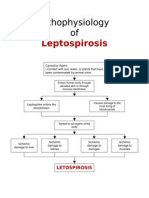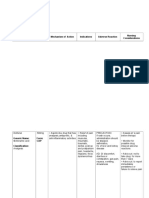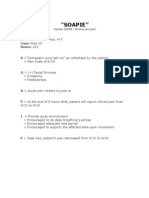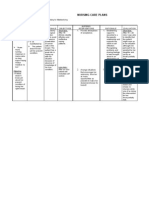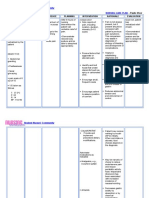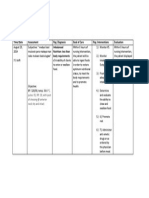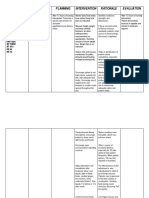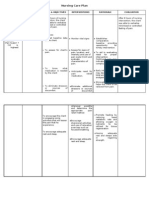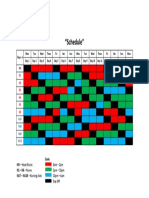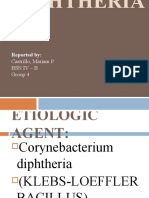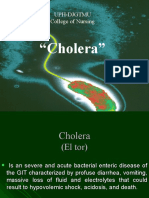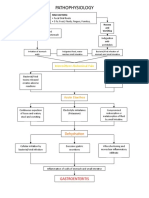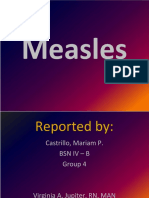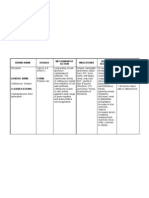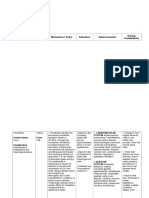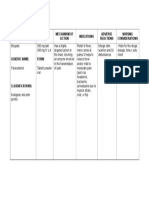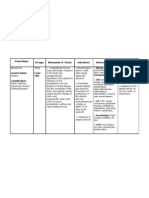0 ratings0% found this document useful (0 votes)
5K viewsBreast Mass Bilateral To Consider Fibroadenoma
The nursing care plan addresses a patient diagnosed with a breast mass who is experiencing pain and lack of knowledge about her condition. The plan involves monitoring the patient's fluid intake and output to prevent dehydration from vomiting, ensuring adequate sleep through pain management and reducing stress, and providing education to increase the patient's understanding of her disease process and self-care abilities. The goals are for the patient to regain fluid volume and experience relief from pain within 8 hours, and to maintain healthy habits and full understanding upon discharge from the hospital.
Uploaded by
Yum CCopyright
© Attribution Non-Commercial (BY-NC)
We take content rights seriously. If you suspect this is your content, claim it here.
Available Formats
Download as DOC, PDF, TXT or read online on Scribd
0 ratings0% found this document useful (0 votes)
5K viewsBreast Mass Bilateral To Consider Fibroadenoma
The nursing care plan addresses a patient diagnosed with a breast mass who is experiencing pain and lack of knowledge about her condition. The plan involves monitoring the patient's fluid intake and output to prevent dehydration from vomiting, ensuring adequate sleep through pain management and reducing stress, and providing education to increase the patient's understanding of her disease process and self-care abilities. The goals are for the patient to regain fluid volume and experience relief from pain within 8 hours, and to maintain healthy habits and full understanding upon discharge from the hospital.
Uploaded by
Yum CCopyright
© Attribution Non-Commercial (BY-NC)
We take content rights seriously. If you suspect this is your content, claim it here.
Available Formats
Download as DOC, PDF, TXT or read online on Scribd
You are on page 1/ 5
NURSING CARE PLAN
(sample)
Medical Diagnosis: Breast mass bilateral to consider fibroadenoma.
Nursing Diagnosis: Deficient fluid volume related to vomiting.
Short term goal: After 8hours of nursing intervention, patient will replace the loss body fluid.
Long term goal: After hospitalization days, patient will be able to maintain adequate fluid volume as evidence by moist lips
and.good skin color.
Assessment Nursing Problem Scientific Reason Intervention Rationale Evaluation
Subjective Cues: Dehydration or Postoperative nausea - Increase fluid - To prevent After
“Nang hihina ako electrolyte and vomiting is the intake dehydration hospitalization, the
kakasuka” as imbalance most frequent side patient maintained
verbalized by the effect after - Continue giving IV - To replace fluid adequate fluid
patient. anesthesia. as ordered by the loss volume as
Postoperative nausea doctor evidence by moist
Objective cues: and vomiting is lips and good skin
- Chapped lips always self-limiting - Monitor patient’s - Indicator of overall color.
- (+) Vomit 4x and non-fatal, it can weight fluid and nutritional
after surgery cause significant status
- Dryness of morbidity, including
buccal dehydration and - Monitor vital signs - To know the
mucosa electrolyte imbalance. every 2hours patient’s condition
- Weight from
57kg – 55kg - Elevate bed up to - For the client to
neck with low pillow decreased dizziness
as doctor’s ordered and feel comfortable
- Monitor intake and - Provides
output information about
overall fluid balance
NURSING CARE PLAN
(sample)
Medical Diagnosis: Breast mass bilateral to consider fibroadenoma.
Nursing Diagnosis: Disturbed sleeping pattern related to shortness of breath.
Short term goal: After 8hours of shift, patient will report at least 4 hours of sleep.
Long term goal: After hospitalization, the patient will have complete sleep and rest periods.
Assessment Nursing Problem Scientific Reason Intervention Rationale Evaluation
Subjective Cues: Disturbed sleeping Decreased REM that - Monitor vital signs - To know the After
“Paputol putol ang pattern can cause impaired patient’s condition hospitalization, the
tulog ko” as processing patient has
verbalized by the information in the - Assess the cause - To know complete sleep
patient. brain that lead to of sleep deprivation underlying condition and rest periods.
disturbed sleeping
Objective cues: pattern - Encourage patient - To divert patient’s
- Restlessness to diversional attention from the
- Inability to activities surgical pain
concentrate
- Provide quite - This provide
environment conducive
environment for the
patient
-Explore other sleep - To promote
aids such as warm wellness
bath or milk
NURSING CARE PLAN
(sample)
Medical Diagnosis: Breast mass bilateral to consider fibroadenoma.
Nursing Diagnosis: Acute pain related to post surgical incision or inflammation of breast.
Short term goal: After 8hours of nursing intervention, patient will report relieve pain from 8/10-6/10.
Long term goal: After hospitalization days, the patient will report relief pain.
Assessment Nursing Problem Scientific Reason Intervention Rationale Evaluation
Subjective Cues: Post operative pain Because of the tissue - Assess for referred - To help determine After
“Masakit pa ang trauma, the pain of underlying hospitalization
opera ko” as inflammatory process condition or organ days, the patient
verbalized by the of body is being dysfunction will report relieved
patient. activated by relasing requiring treatment pain.
histamine, substance
- Pain Scale 8/10 P, bradikinin, - Note client’s - To help the client
prostaglandin, attitude toward pain to verbalized the
endokokinins which intensity of pain
Objective cues: are highly acidic.
- (+) Facial Increased - Encourage patient - To divert patient’s
grimace acidity on the trauma to diversional attention from the
- Narrowed site or the injuired site activities pain
focus heighten in pain fibers
- Observed which stimulates the - Allow the client to - Verbalization
evidence of sensation of pain and verbalized allows outlet for
pain makes pain more expression about emotions and may
- Expressive intensed. pain enhance coping
behavior mechanism
- Give medicine for - To lessen the pain
pain of the patient
NURSING CARE PLAN
(sample)
Medical Diagnosis: Breast mass bilateral to consider fibroadenoma.
Nursing Diagnosis: Deficient knowledge related to unfamiliarity about disease process
Short term goal: After 8hours of nursing intervention,
Long term goal: At the end of hospitalization days, the patient has evidence of learning plan and actions performed.
Assessment Nursing Problem Scientific Reason Intervention Rationale Evaluation
Subjective Cues: Deficient knowledge There is this presence - Encourage client to - For the client to - At the end of
“Nung nag regarding the of knowledge deficit do breast self monitor her condition hospitalization
pacheckup ako, tska disease process due to some examination regarding with her days, the patient
ko na lang nalaman” unfamiliar information own breast has evidence of
as verbalized by the that causes some learning plan and
- Provide - Information can
patient. confusion to the client actions performed.
explanations of decrease anxiety and
that needs to be reasons for test for the patient to know
Objective cues: discussed. procedures and the procedures to be
- With worried preparation needed done
gaze
- Frequently - Provides knowledge
asking - Review disease base from which
questions process/prognosis. patient can make
about his Discuss informed choices.
condition and hospitalization and Effective
prospective treatment communication and
treatment
as indicated. support at this time
Encourage questions, can diminish anxiety
expression of and promote healing.
concern.
- Identify individual - Activities that may
restriction such as increase pressure
lifting heavy objects that can strains
surgical repairs and
may delay healing.
NURSING CARE PLAN
(sample)
Medical Diagnosis: Breast mass bilateral to consider fibroadenoma.
Nursing Diagnosis: Anxiety related to post operative breast mass removal
Short term goal: After 8hours of nursing intervention, the patient will be able to verbalize absence of or decrease in subjective
distress.
Long term goal: After hospitalization days, the patient will be able to demonstrate improve concentration and accuracy of
thoughts.
Assessment Nursing Problem Scientific Reason Intervention Rationale Evaluation
Subjective Cues: Anxiety Anxiety is a - Assesses client’s - To help the patient At the end of
“Baka tubuan pa ako psychological and level of anxiety. to cope up with hospitalization, the
ng bukol sa ibang physiological state being anxious patient will be able
parte ng dibdib ko” characterized by to demonstrate
as verbalized by the cognitive, somatic, - Encouraged - Provides improve
patient. emotional, and patient to share opportunity to concentration and
behavioral thoughts & verbalize examine realistic accuracy of
Objective cues: components feelings. fears & thoughts.
- Restless And it generalized misconceptions
- Fatigue mood condition that about the illness.
- narrowed occurs without an
focus identifiable triggering - Encourage patient - To lessen anxiety
- Irritability stimulus. to have divertional
activities.
You might also like
- Approaches to Translation -- Newmark, Peter, 1916- -- 1981 -- Oxford ; New York_ Pergamon Press -- 9780080246031 -- 8993ed5438256d24d62fdf84bdc19f43 -- Anna’s ArchiveNo ratings yetApproaches to Translation -- Newmark, Peter, 1916- -- 1981 -- Oxford ; New York_ Pergamon Press -- 9780080246031 -- 8993ed5438256d24d62fdf84bdc19f43 -- Anna’s Archive220 pages
- Nursing Care Plan - Ineffective Airway Clearance88% (26)Nursing Care Plan - Ineffective Airway Clearance3 pages
- Cholecystectomy Nursing Care Plan: Risk For InfectionNo ratings yetCholecystectomy Nursing Care Plan: Risk For Infection1 page
- CP Intestinal Obstruction Nursing Care PlanNo ratings yetCP Intestinal Obstruction Nursing Care Plan7 pages
- Nursing Care Plan (Acute Cholecystitis) - NAVARRANo ratings yetNursing Care Plan (Acute Cholecystitis) - NAVARRA6 pages
- Assessment Nursing Diagnosis Planning Implemantation Rationale Evaluation100% (1)Assessment Nursing Diagnosis Planning Implemantation Rationale Evaluation2 pages
- Nursing Care Plan For Pedia TB Meningitis NCP100% (1)Nursing Care Plan For Pedia TB Meningitis NCP2 pages
- Pre-Operative (Incision & Drainage of Abscess)No ratings yetPre-Operative (Incision & Drainage of Abscess)6 pages
- Gallbladder Cancer Drugs and Nursing Care Plan100% (1)Gallbladder Cancer Drugs and Nursing Care Plan14 pages
- Nursing Care Plan On Breast Cancer: Encourage Adequate Rest Periods100% (5)Nursing Care Plan On Breast Cancer: Encourage Adequate Rest Periods1 page
- Nursing Care Plan-1 Age: 50Y Medical Diagnoses: Leukemia Assessment Nursing Diagnosis Planning Intervention Scientific Rationale EvaluationNo ratings yetNursing Care Plan-1 Age: 50Y Medical Diagnoses: Leukemia Assessment Nursing Diagnosis Planning Intervention Scientific Rationale Evaluation1 page
- Nursing Care Plan: Acute Pain Related To Inflammatory Response Secondary To InfectionNo ratings yetNursing Care Plan: Acute Pain Related To Inflammatory Response Secondary To Infection2 pages
- Question 1. Hypothetical Situation Which Includes Client's Assessment (History, Manifestations, Etc ) To Establish The ConditionNo ratings yetQuestion 1. Hypothetical Situation Which Includes Client's Assessment (History, Manifestations, Etc ) To Establish The Condition12 pages
- Reported By:: Castrillo, Mariam P. BSN Iv - B Group 4No ratings yetReported By:: Castrillo, Mariam P. BSN Iv - B Group 417 pages
- Nursing Management Process and FunctionsNo ratings yetNursing Management Process and Functions151 pages
- Paracetamol (Aeknil), Metoclopramide (Plasil), Cotrimoxazole Susp. (Macromed), Pedialyte100% (2)Paracetamol (Aeknil), Metoclopramide (Plasil), Cotrimoxazole Susp. (Macromed), Pedialyte4 pages
- Unit Dimensions and Measurement Practice Problem by Pristiadi Utomo100% (3)Unit Dimensions and Measurement Practice Problem by Pristiadi Utomo4 pages
- Instant Download Corporate Communication; Concepts and Practice 3rd Edition Jaishri Jethwaney PDF All Chapters100% (1)Instant Download Corporate Communication; Concepts and Practice 3rd Edition Jaishri Jethwaney PDF All Chapters55 pages
- L5a Creating Customer Loyalties & SatisfactionNo ratings yetL5a Creating Customer Loyalties & Satisfaction38 pages
- ENG1044 - CW2 Written Response Prompt [Sept 2024]No ratings yetENG1044 - CW2 Written Response Prompt [Sept 2024]4 pages


